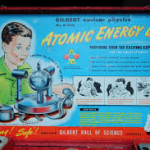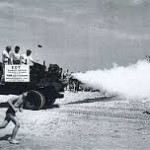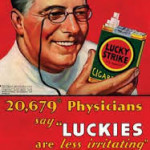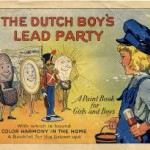 If you grew up in the 50s, 60s, or 70s, it’s a miracle you’re alive. There’s a reason for the saying, “The road to hell is paved with good intentions.” In other words, raising your children with danger and bad medicine didn’t end with the discovery of seatbelts and penicillin.
If you grew up in the 50s, 60s, or 70s, it’s a miracle you’re alive. There’s a reason for the saying, “The road to hell is paved with good intentions.” In other words, raising your children with danger and bad medicine didn’t end with the discovery of seatbelts and penicillin.
I can hear my mother now: “If a little does a little good, a lot will do a lot of good.” This was her rationale for ignoring dosing instructions on over-the-counter medications. To her, a tablespoon was a serving spoon from the table. A teaspoon was the soup spoon. She cheerfully ladled out Pepto-Bismol to reverse my problem, then ladled out mineral oil to reverse the cure. I was almost grown before I knew medicine doses measured like salt and baking powder, not mashed potatoes.
My mother was a helicopter parent long before helicopters were invented. Maybe she was a spiro-gyro or hot air balloon parent. Worrying was a way of life for her, and we were first on her list. A sneeze or cough was enough to make her drag us off to the doctor, where we were guaranteed a penicillin shot. The miracle drug was dispensed for complaints big and small. After all, what’s the use of having a miracle drug, if you aren’t going to use it for everything? And if we were really sick, too sick to go downtown to the Medical Arts building to his office, the doctor would stop by our house on his way home, and he always had a supply of penicillin in his bag.
The bathroom medicine cabinet was full of over-the-counter remedies, too. Pepto-Bismol, iodine, mercurochrome, Little Black Pills, and Carter’s Little Liver Pills all played a role in keeping the family healthy. Bayer aspirin, and later Excedrin, were the cure-alls for headaches. Aspirin, hot tea, and dry toast was the treatment for cramps. Little Black Pills were for constipation, with Pepto for diarrhea. Cuts and abrasions called for iodine. Always. Period.
My parents would have fit right into the Stoics’ society. If there were no bones sticking out and no blood, you were fine. Suck it up and walk it off. Of course, first we had to annihilate the enemy of the Free World–germs. These little critters were a relatively new discovery when my parents were little, and their parents attacked them as if they were going after “Kaiser Bill.”
For a good part of my childhood, iodine was the poison du jour for medical germicide. Unfortunately, iodine felt like having lava poured into an open wound, probably because it had an alcohol base. Screaming because of the injury redoubled when I felt the cure.
There was a kinder, gentler antiseptic–mercurochrome. It didn’t burn nearly as badly, and much of the discomfort it caused could be eliminated by blowing on the wound until it dried. No one considered the fact that blowing germ-laden breath on an open wound was counter-productive. In addition, it didn’t seem to impress anyone negatively that the active ingredient was mercury. Yes, as in “permanent brain damage” mercury. Mercurochrome wasn’t banned as an over-the-counter product until 1998.
And speaking of mercury, we loved it when Mama dropped the thermometer while “shaking it down,” shattering it on the tile bathroom floor. That provided a really cool, new toy to play with: mercury. We were fascinated by the way it “crawled” when it moved, and even more awed by how well it cleaned tarnish off dimes and nickels when we smeared it over the coins with our bare fingers.
Dental care was high on the list for “better living through chemistry.” When an Air Force dentist looked at my husband’s teeth and exclaimed, “Good grief, boy! You’ve got Cadillac teeth!” there was a brief moment of alarm, before Bryan realized this was a good thing. His hometown, Pasadena, Texas, was one of the first cities in the state to put fluoride in their drinking water. Consequently, cavities were rare, but their smiles looked like a “before” picture in a whitening gel commercial. The recipe needed a little fine tuning.
 DDT trucks driving up and down the streets, spraying for mosquitoes, were also part of growing up in Pasadena. Bryan and his friends rode their bikes in the fog behind the trucks for fun.
DDT trucks driving up and down the streets, spraying for mosquitoes, were also part of growing up in Pasadena. Bryan and his friends rode their bikes in the fog behind the trucks for fun.
If being endangered by your parents and health care professionals wasn’t enough, toymakers and Madison Avenue joined in, too. No cool kid would have dreamed of wearing a helmet when riding a bike. I remember my father saying, “Aw, she doesn’t have to wear one of those. Nothing’s going to happen. Besides, she can hardly see out from under it. That thing’s dangerous.” And why on earth would you need child-proof packaging on medications and drain cleaner? “Kids know better than to get into those.”
My brother had a chemistry set. He managed to make his room smell like dead fish for a month, but at least no one was killed. Early Gilbert Chemistry Sets included 56 chemicals, such as ammonium nitrate (a key ingredient in homemade bombs) and the poisonous and flammable potassium permanganate. The “Atomic” chemistry sets of the ’50s came with radioactive uranium ore. They got a little safer in the ’60s but weren’t really reined in until the Toxic Substances Control Act of 1976.
 As if the sexy men and women puffing away in movies weren’t convincing enough, we were encouraged to smoke by actors dressed like doctors on television. No one had even heard of secondhand smoke. And remember candy cigarettes? I used to get them in my Christmas stocking.
As if the sexy men and women puffing away in movies weren’t convincing enough, we were encouraged to smoke by actors dressed like doctors on television. No one had even heard of secondhand smoke. And remember candy cigarettes? I used to get them in my Christmas stocking.
Car seats and seatbelts were optional.  And lead-based paint, which causes brain and kidney damage, wasn’t outlawed until 1978. It was routinely used on cribs, among other things.
And lead-based paint, which causes brain and kidney damage, wasn’t outlawed until 1978. It was routinely used on cribs, among other things.
I don’t blame my parents. They only knew what they saw on TV and in the newspaper. I do blame the scientists and advertisers who knew these things were dangerous, even if they didn’t know the full extent. They ignored the fact that people were buying and using their poisons, and it really hasn’t changed much over the years. It seems like every day something is recalled or declared unsafe, something we did to our newborns is now considered deadly, and some medicine our parents gave us is now used to kill roaches.
There are seven billion people on the earth, and the population is growing. How can that be when we are doing our best to kill ourselves off? Maybe it’s the underdeveloped countries, whose people don’t have access to our medicines, cleaning products, and chemical-infused food, who are overpopulating. They better hope the don’t catch up to us. That could be a real health hazard.